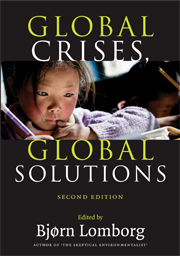Book contents
- Frontmatter
- Contents
- List of figures
- List of tables
- List of contributors
- Acknowledgements
- List of abbreviations and acronyms
- Introduction
- PART I THE CHALLENGES
- 1 Air pollution
- 2 The security challenge in conflict-prone countries
- 3 Disease control
- 4 The benefits and costs of alternative strategies to improve educational outcomes
- 5 Climate change
- 6 Hunger and malnutrition
- 7 Water and sanitation
- 8 The challenge of reducing international trade and migration barriers
- 9 Transnational terrorism
- 10 Women and development
- PART II RANKING THE OPPORTUNITIES
- Conclusion
2 - The security challenge in conflict-prone countries
Published online by Cambridge University Press: 05 June 2012
- Frontmatter
- Contents
- List of figures
- List of tables
- List of contributors
- Acknowledgements
- List of abbreviations and acronyms
- Introduction
- PART I THE CHALLENGES
- 1 Air pollution
- 2 The security challenge in conflict-prone countries
- 3 Disease control
- 4 The benefits and costs of alternative strategies to improve educational outcomes
- 5 Climate change
- 6 Hunger and malnutrition
- 7 Water and sanitation
- 8 The challenge of reducing international trade and migration barriers
- 9 Transnational terrorism
- 10 Women and development
- PART II RANKING THE OPPORTUNITIES
- Conclusion
Summary
Overview
Definition of the Challenge
Large-scale violent conflict takes several forms, and our focus is far from comprehensive. Recent media attention has been dominated by Iraq and it is important to acknowledge at the outset that this type of situation is not covered in our analysis. Iraq is in many respects highly atypical of modern conflict. It began as an international war, yet over time international conflict has tended to become far less common. Most warfare in low-income countries is internal. The situation in Iraq has indeed evolved into what is currently probably best described as an ongoing civil war. While our focus is indeed civil war, the interventions that we evaluate here are designed to prevent rather than arrest such wars. In the first Challenge paper on Conflicts for the Copenhagen Consensus, Collier and Hoeffler (2004c) also chose to focus on civil wars. However, within this remit they were more ambitious than the present chapter, including the “deep prevention” of civil war, the ending of on-going conflicts, and the prevention of the recurrence of violence in post-conflict situations. In this chapter, our ambition is more limited. We focus predominantly on the prevention of the recurrence of violence in post-conflict societies. This restricted focus enables us to consider post-conflict instruments in more depth, and it is also the core of the problem of violent conflict.
- Type
- Chapter
- Information
- Global Crises, Global SolutionsCosts and Benefits, pp. 58 - 125Publisher: Cambridge University PressPrint publication year: 2009
- 9
- Cited by



